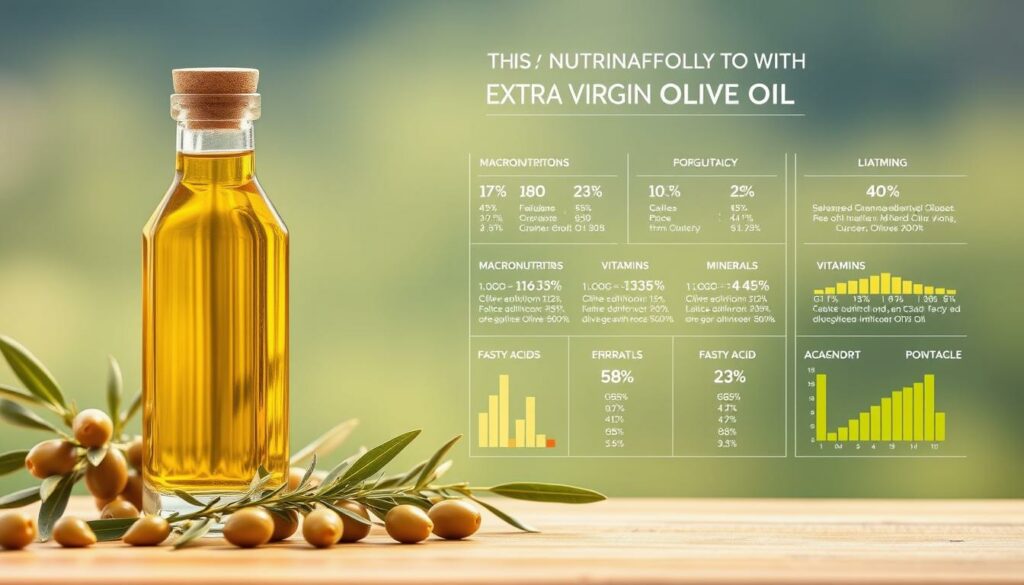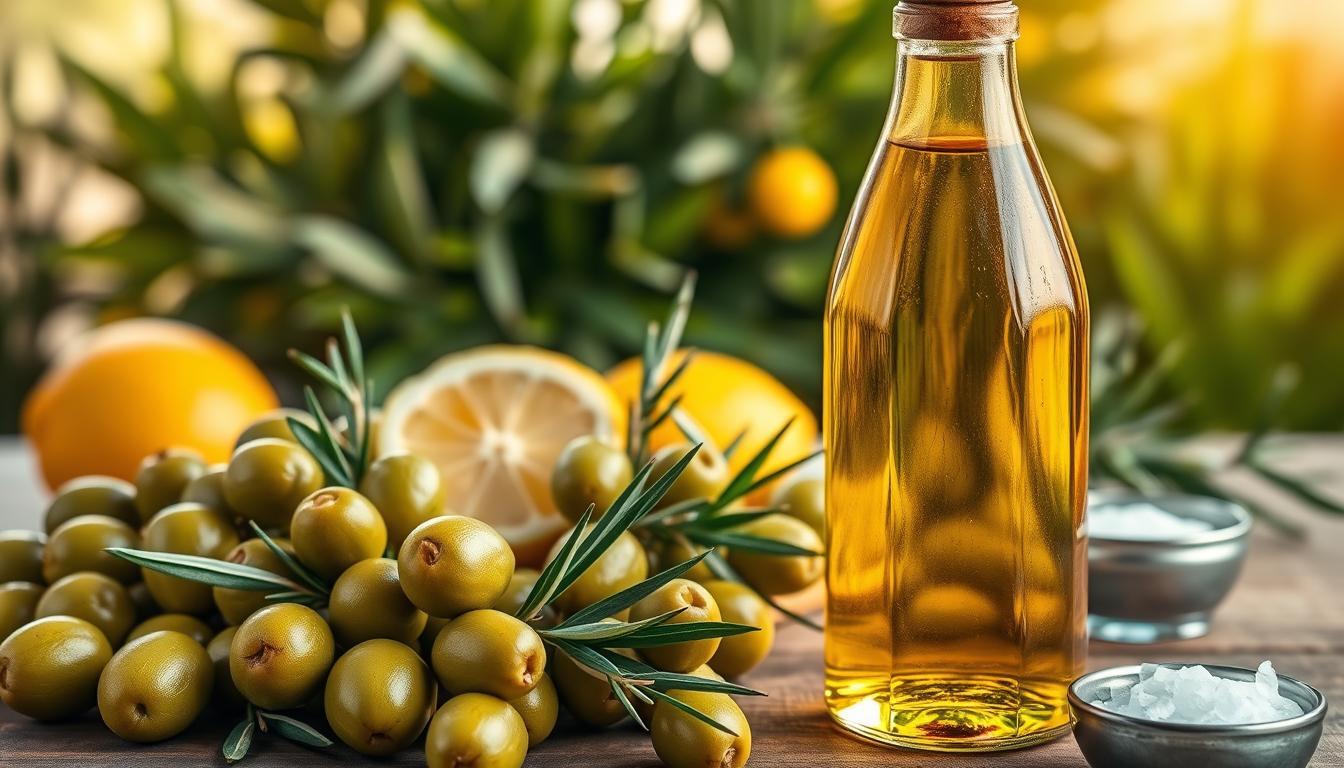I’ve always been intrigued by the health benefits of olive oil. It’s a key part of the Mediterranean diet, known for its positive effects on health and weight management. Adding olive oil to your diet is very important, whether you want to get healthier or lose weight.
In this article, we’ll look at the amazing benefits of olive oil. We’ll see how it fits into a healthy diet and helps with weight loss. We’ll dive into the latest research to understand how olive oil can enhance your lifestyle.
Key Takeaways
- Incorporating olive oil into your diet can have numerous health benefits.
- Olive oil plays a significant role in weight management.
- A healthy diet rich in olive oil can improve overall well-being.
- The Mediterranean diet, which features olive oil as a staple, is associated with various positive health outcomes.
- Olive oil’s nutritional properties make it an ideal choice for those seeking to lose weight.
The Mediterranean Gold: Understanding Olive Oil
Olive oil is more than just a cooking ingredient. It has a rich history and many health benefits. As I explore olive oil, its importance goes beyond the kitchen.

What Makes Olive Oil Special
Olive oil stands out because of how it’s made and what it contains. Olives are carefully picked and pressed. This makes olive oil full of essential fatty acids and antioxidants. Key reasons for its uniqueness include:
- High-quality production processes
- Rich in healthy fats
- Presence of antioxidants
Historical Significance and Modern Relevance
Olive oil has been key to the Mediterranean diet for centuries. It’s deeply rooted in the region’s food and culture. Even today, it’s valued for its health benefits, like supporting heart health and helping with weight management.
The Nutritional Profile of Olive Oil
Olive oil is packed with good stuff. It’s mostly fats, but the quality of these fats is what makes it special. It also has other nutrients that are great for you.

Essential Fatty Acids and Their Importance
Olive oil is full of monounsaturated fats, like oleic acid. This is an essential fatty acid. It’s good for your heart because it lowers inflammation and improves your cholesterol levels.
Vitamins, Antioxidants, and Bioactive Compounds
Olive oil isn’t just fats. It also has vitamins, antioxidants, and bioactive compounds. These include polyphenols and vitamin E, which are good for your health.
Polyphenols and Their Health Effects
The polyphenols in olive oil are very beneficial. They help fight inflammation and protect against diseases. This makes olive oil a nutritious choice.
Vitamin E and Other Micronutrients
Olive oil is also a good source of vitamin E. Vitamin E is an antioxidant that keeps cells healthy. Other nutrients in olive oil add to its nutritional value, making it a healthy part of your diet.
Olive Oil Benefits for Healthy People and Weight Loss
Olive oil is more than just a tasty addition to meals. It’s great for your health and can help with weight loss. It’s full of healthy fats, making it key to a balanced diet.
How Olive Oil Supports Overall Health
Olive oil is packed with antioxidants and healthy fats. These are vital for keeping you healthy. The antioxidants in olive oil protect cells and lower the risk of diseases. It also improves heart health and reduces inflammation.
It’s also a good source of vitamins E and K. These vitamins boost your immune system and help with bone health. Olive oil’s anti-inflammatory properties add to its health benefits.
The Connection Between Olive Oil and Weight Management
Olive oil is helpful for managing weight. Its monounsaturated fats make you feel full longer. Switching to olive oil from unhealthy fats is a smart move for weight control.
Replacing Unhealthy Fats with Olive Oil
Choosing olive oil over unhealthy fats can make a big difference. It’s a better choice for cooking and dressings. For example, using olive oil instead of butter or margarine cuts down on saturated fats.
| Unhealthy Fat | Olive Oil Benefits |
|---|---|
| Butter | Higher in saturated fats; olive oil is richer in healthy monounsaturated fats |
| Margarine | Often contains trans fats; olive oil is trans fat-free |
Olive Oil in Mediterranean Diet Weight Loss Studies
Many studies have looked at olive oil’s role in the Mediterranean diet. This diet is linked to weight loss and better health.
“The Mediterranean diet, characterized by high olive oil consumption, has been shown to promote weight loss and reduce the risk of chronic diseases.”
Adding olive oil to your diet, like in the Mediterranean diet, can help with weight loss.
Heart Health: Olive Oil’s Most Celebrated Benefit
Olive oil is known for its great impact on heart health. Many studies support this. The Mediterranean diet, full of olive oil, lowers heart disease rates.
Cholesterol Regulation and Arterial Health
Olive oil has lots of monounsaturated fats. These fats help control cholesterol levels. They lower “bad” cholesterol and keep “good” cholesterol levels up.
This balance is key for healthy arteries. It stops plaque buildup that can cause atherosclerosis.
Blood Pressure Management and Cardiovascular Protection
Drinking olive oil regularly can also help with blood pressure. Its antioxidants, like oleuropein, improve blood pressure. This boosts overall heart health by easing heart and artery strain.
Olive oil’s anti-inflammatory effects also protect against heart diseases. Adding olive oil to your diet is a big step towards better heart health. Its many benefits make it a vital part of a heart-healthy diet.
Anti-Inflammatory Properties and Chronic Disease Prevention
Olive oil has been shown to lower the risk of many chronic conditions. Chronic inflammation is a major risk factor for diseases. Olive oil might help reduce this risk, making it a key area of study.
How Olive Oil Fights Inflammation
Olive oil contains compounds like oleocanthal, which fight inflammation. These compounds block enzymes that cause inflammation. Regularly eating olive oil can help lower inflammation.
Potential Protection Against Chronic Diseases
Olive oil’s anti-inflammatory effects might protect against chronic diseases. It can prevent conditions caused by long-term inflammation.
Cancer Risk Reduction
Studies show olive oil might lower cancer risk. Oleocanthal is being studied for its anti-cancer properties.
Diabetes Management Benefits
Olive oil’s anti-inflammatory effects could help with diabetes. It improves insulin sensitivity and reduces inflammation linked to diabetes.
Eating olive oil can help reduce chronic disease risk. It’s a simple way to get its anti-inflammatory benefits.
Olive Oil and Brain Health
Olive oil might do more than just help your heart. It could also boost brain health. This is based on early studies that show it might support brain health.
Cognitive Function and Neuroprotection
Research is looking into how olive oil affects the brain. It seems that the antioxidants and polyphenols in olive oil might protect the brain. This could help keep the brain sharp as we age.
The anti-inflammatory properties of olive oil might also help the brain stay healthy.
Potential Role in Preventing Neurodegenerative Diseases
Studies hint that olive oil might lower the risk of diseases like Alzheimer’s and Parkinson’s. More research is needed to understand how it works. But the early signs are encouraging.
Here’s a table comparing olive oil’s effects on these diseases:
| Disease | Potential Benefits of Olive Oil | Key Components |
|---|---|---|
| Alzheimer’s | Reduced risk, improved cognitive function | Antioxidants, polyphenols |
| Parkinson’s | Neuroprotection, possible delay in disease progression | Oleocanthal, hydroxytyrosol |
In summary, olive oil might be good for your brain. It could help with thinking skills and even lower disease risk. As scientists learn more, adding olive oil to your diet could be a smart move for brain health.
The Weight Loss Connection: How Olive Oil Helps Shed Pounds
Olive oil plays a big role in managing weight. It’s a key part of the Mediterranean diet, known for its health benefits. Studies have shown it can help with weight loss.
Satiety and Appetite Control Mechanisms
Olive oil helps you feel full, which is key for weight loss. Its monounsaturated fats are digested slowly, which delays hunger. Its rich flavor also makes meals more satisfying, leading to fewer calories.
Some compounds in olive oil affect hunger hormones. Oleic acid, a major part of olive oil, influences hormones that control appetite.
The Oleic Acid Advantage
Oleic acid, the main fatty acid in olive oil, is good for weight management. It helps improve metabolic health and aids in fat burning.
Metabolic Effects and Fat Burning
Olive oil’s impact on metabolism is important for weight loss. Its monounsaturated fats improve insulin sensitivity. This helps glucose enter cells better, reducing fat storage.
Hormonal Influences on Weight Management
Olive oil’s hormonal effects also aid in weight loss. It may balance hunger hormones like leptin and ghrelin. This helps regulate appetite and support weight reduction.
Adding olive oil to your diet does more than just flavor your meals. It supports weight loss through various mechanisms. It’s a valuable part of a healthy weight management plan.
Different Types of Olive Oil and Their Benefits
It’s important to know the different types of olive oil. This knowledge helps you use it for health and cooking. Olive oil is mainly sorted by how it’s made, its quality, and taste.
Extra Virgin vs. Virgin vs. Regular Olive Oil
Olive oils differ mainly in how they’re made and their quality. Extra Virgin Olive Oil (EVOO) is top-notch because it’s processed little and has low acidity (less than 0.8%). It’s packed with antioxidants and has a unique taste. Virgin Olive Oil is also high quality but has a bit more acidity than EVOO. Regular Olive Oil is a mix of refined and virgin oils. It tastes neutral and has more acidity.
How Processing Affects Nutritional Value
How olive oil is processed changes its nutritional value. Oils like EVOO, which is processed less, keep more nutrients and antioxidants. On the other hand, oils that are processed a lot might lose some of their good stuff.
Identifying Quality Olive Oil
To find good olive oil, look for Extra Virgin or Virgin labels. Also, check the acidity level and where it’s from. Good producers share details about how they make their oil.
Organic and Non-Organic Considerations
Choosing between organic and non-organic olive oil depends on farming methods. Organic oil is made without harmful chemicals. But, both types can be great if made with care.
| Type of Olive Oil | Acidity Level | Nutritional Value |
|---|---|---|
| Extra Virgin Olive Oil | Less than 0.8% | High in antioxidants and nutrients |
| Virgin Olive Oil | Less than 2% | High in antioxidants, slightly lower than EVOO |
| Regular Olive Oil | Variable | Lower nutritional value due to refining |
Incorporating Olive Oil Into Your Daily Diet
Olive oil is more than just a cooking ingredient. It’s a way to boost your health. Its rich nutrients and versatility make it easy to add to your kitchen.
Cooking Methods That Preserve Benefits
When cooking with olive oil, choose methods that keep its nutrients intact. Low-heat cooking, like sautéing or making dressings, is best. High-heat frying can harm its delicate compounds.
Some good cooking methods include:
- Gentle sautéing
- Making marinades
- Preparing salad dressings
Creative Ways to Use Olive Oil Beyond Cooking
Olive oil has uses beyond the kitchen. Here are some creative uses for olive oil:
Olive Oil in Salad Dressings and Marinades
Using olive oil in salad dressings adds flavor and nutrition. Mix it with vinegar or lemon juice for a healthy dressing.
Unexpected Uses: Beauty, Skin Care, and More
Olive oil is great for skin care. It can moisturize, remove makeup, or treat hair. Its antioxidants make it a favorite in natural beauty routines.
Scientific Research Supporting Olive Oil’s Health Claims
Many clinical studies back up the health benefits of olive oil. Scientists have been studying its effects on human health. This research has shown us a lot about its advantages.
Major Clinical Studies and Their Findings
Some studies have been very important in understanding olive oil’s health benefits. For example, the PREDIMED trial showed that a Mediterranean diet with olive oil lowers heart disease risk. Key findings from such studies include:
- Improved heart health through cholesterol regulation and reduced inflammation
- Potential anti-cancer properties, like reducing breast cancer risk
- Neuroprotective effects that may prevent cognitive decline
These studies have given us important insights into how olive oil helps our health.
Ongoing Research and Future Directions
Research on olive oil is ongoing, looking into its health benefits. Scientists are studying how olive oil affects our health at a molecular level. Future research directions may include:
- Looking into olive oil’s impact on gut health and overall health
- Examining its benefits in preventing and managing neurodegenerative diseases
- Understanding its role in cancer prevention and treatment
As research continues, we’ll learn more about olive oil’s health benefits. We’ll also find out how to use it to improve our health even more.
Conclusion: Embracing Olive Oil for a Healthier Lifestyle
Olive oil is key to a healthier lifestyle, with many benefits. It helps with heart health and weight management. Its nutrients, like essential fatty acids and antioxidants, make it great for a balanced diet.
Adding olive oil to your meals is easy and tasty. You can use it as a finishing touch or in cooking to keep its nutrients. Making olive oil a kitchen staple is a big step towards a healthier life.
The benefits of olive oil are clear: it’s good for you and can improve your well-being. Try different types of olive oil to find the best for your cooking.
Choosing olive oil means more than just healthier cooking. It’s a choice for a lifestyle that values wellness and nutrition. As studies show more about olive oil, its importance in a healthy lifestyle grows.
FAQ
What are the health benefits of consuming olive oil?
Olive oil is good for your health. It can lower heart disease risk, help with weight, and fight inflammation.
How does olive oil support heart health?
It helps your heart by controlling cholesterol, improving blood flow, and managing blood pressure. These actions lower heart disease risk.
Can olive oil help with weight loss?
Yes, it can help with weight loss. It makes you feel full, controls hunger, and may boost metabolism and fat burning.
What is the difference between extra virgin, virgin, and regular olive oil?
Extra virgin olive oil is the best quality. It’s made with minimal processing and has lots of good stuff called polyphenols.
How should olive oil be stored to preserve its nutritional benefits?
Keep it cool and dark to keep its good stuff. Heat and light can damage it.
Can olive oil be used for cooking, and if so, how?
Yes, it’s good for cooking at low heat. It’s perfect for sautéing veggies or making salad dressings.
What are the anti-inflammatory effects of olive oil?
It has compounds that fight inflammation. This may protect against diseases like cancer and diabetes.
Is there a connection between olive oil consumption and brain health?
Studies show it might improve brain function and lower neurodegenerative disease risk.
How does olive oil fit into the Mediterranean diet?
It’s a key part of the Mediterranean diet. This diet is linked to health benefits like weight loss and disease prevention.
What are the benefits of choosing organic olive oil?
Organic olive oil might be cleaner. It has less pesticides and chemicals, making it a natural choice.
Can olive oil be used for purposes other than cooking?
Yes, it’s great for beauty and skin care. Its moisturizing and antioxidant properties make it beneficial.


